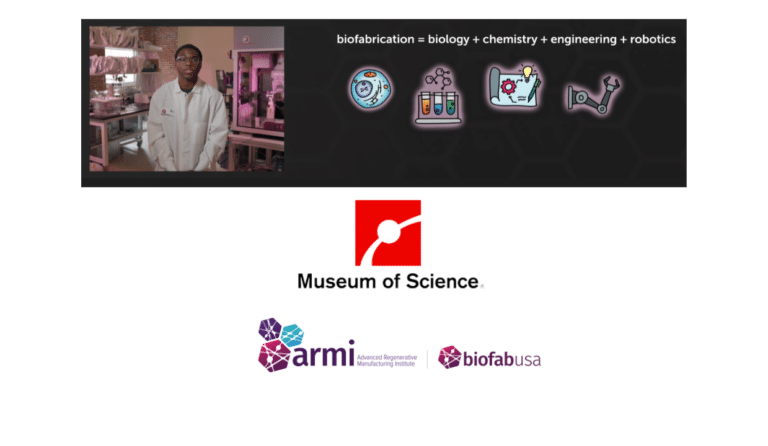Editor’s Note: This article was originally featured in the New Hampshire Union Leader on March 5, 2022, highlighting ARMI | BioFabUSA’s “Tissue Foundry” to manufacture human tissue for clinical trials.
IN ONE OF the mammoth brick buildings in the Millyard, engineers at Mobius Mobility work on stair-climbing wheelchairs and roving robots that deliver packages. Down a long hallway, the smell of paint and the buzz of power tools fill the air at one of inventor Dean Kamen’s other projects.
Here construction crews are readying a manufacturing space equipped with a suite of seven clean rooms, a walk-in refrigerator and a garage-door-sized freight elevator to transport the precious cargo that will be produced here.
Spare parts for the people who need them: Lungs, livers, kidneys, hearts.
It’s been nearly five years since Kamen announced the launch of BioFabUSA, a program of the Advanced Regenerative Manufacturing Institute to jump-start the large-scale production of synthetic human tissue.
ARMI was primed with an $80 million grant from the U.S. Department of Defense, which supported the effort for its potential to help injured soldiers. The project is a collaboration between biotech companies, research institutions, government agencies and other partners, who pledged $214 million worth of additional support. In 2020, the U.S. Department of Health and Human Services announced it would award ARMI up to $51 million over five years to develop “priority medicines” for critical needs.
“When we started this thing I was ambitiously saying we’re going to have 50 members in the next couple of years. I was wrong. We don’t have 50. We have 176,” Kamen said Thursday at the worksite. “We were going to get a few of the cutting-edge med schools. We got all of the med schools.”
Until now, what ARMI did not have was the manufacturing space that demonstrates to the world that its goals are attainable.
While there are as many as a dozen projects underway with collaborators around the country, the work produced in Manchester has largely been limited to research and development.
Other tenants include Wisconsin-based Rockwell Automation; Lung Bio, a unit of Maryland-based United Therapeutics; and Kentucky-based Advanced Solutions.
Advanced Solutions, which designed a 3-D printer with a robotic arm that produces human tissue, was a finalist last year for the New Hampshire Tech Alliance’s Product of the Year award. Kamen is counting on companies like Advanced Solutions and Organamet Bio to draw other players here. And they are already coming.
“We got one clean room up, and before we got it finished, another member said we need one,” Kamen said. “We’re already overbooked.”
Under the direction of Chief Technology Officer Tom Bollenbach, BioFabUSA has created a “tissue foundry” as a working prototype to manufacture cells, which increases the rate needed to produce them for early clinical trials.
During a tour of the clinical manufacturing lab, Bollenbach noted some of the special needs of the workspace — conditions not required when buildings like these were erected to produce textiles in the 19th century.
“The difference between this and an academic lab is we need cleaner, controlled airflow to keep these products from being contaminated because you can’t sterilize them. Otherwise, they will die,” Bollenbach said.
Kamen hopes ARMI’s progress on the manufacturing space will help it secure up to $100 million from the U.S. Economic Development Administration as part of the Build Back Better Regional Challenge. ARMI is one of 50 finalists nationwide and the only one from New Hampshire.
He compares ARMI’s potential to Silicon Valley but one with a much wider impact.
“The health care budget of this country makes what we spend on our electronic toys look like chump change,” Kamen said.
“If we can bend the curve of health care by creating an industry to cure conditions as opposed to treat them, if you could eliminate the need for dialysis, eliminate the need for insulin pumps, eliminate the need to be on a waiting list for a cadaver organ to get you a kidney or a liver or an arm — if you can manufacture these things, the impact on quality of life is unbelievable.”
And why not bend the curve in the Queen City, the adopted home of a New York transplant who four decades ago saw the future in a massive complex of empty mill buildings and started buying them.
“Where do you go to find the skill sets, the people, the customers, to make organs? There isn’t a place yet,” Kamen said. “It’s going to be here.”






